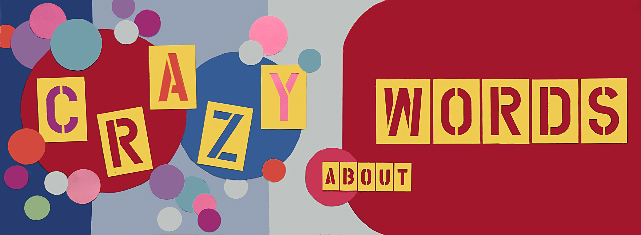Dictionary mania
Joe Mc Kay’s “Crazy About Words”
…toasting our language since 2003!
Ralph Waldo Emerson said, “Every word was once a poem.” It’s an etymologist’s delight, reminding us that every word, like a poem, originated from one someone’s necessity to express a thought. Like ‘emoticon,’ (1994), a word blend of ‘emotion’ and ‘icon,’ meaning a symbol used in email :).
I recall Emerson’s quote each year at this time as my “Crazy About Words” volunteers and I personalize and distribute copies of A Student’s Dictionary to over 300 third graders at nine schools here on the East End of Long Island, as local sponsors of The Dictionary Project.
“Adopt a pet letter…” I urge the kids, after they’ve each been called up by name, in a gathering in the school cafeteria, auditorium, or, if it’s recent construction, the cafeterium. “Now find the section in your dictionary devoted to that letter…”
I don’t believe any fabulous dignitary invited to speak and distribute diplomas at an Ivy League graduation could feel better than we do watching a gaggle of 8-9 year old boys and girls peek into a personalized copy of their very own first dictionary. The wriggling and giggling and sharing of discoveries as they flip the pages would give heart to anyone worried about the future of print.
“Next, look for a 5-letter word you don’t know, beginning with that letter,” I guide them. This, I believe, was what Emerson had in mind; the discovery of a word too, is poetry!
Let’s play an adult version of this game. Wherever you, dear “Crazy About Words” reader, are sitting at this moment, reach for your favorite dictionary and open it to a random page…
I’ve flipped open to p. 311 of my Webster’s College Dictionary, a page full of words with “counter-” as prefix. I run my finger down the left column, and discover ‘counterpane’…a quilt. But the formation isn’t clear to me until I look up ‘pane’ as well. It’s from Latin pannus…cloth or rag. Along the etymological path, it became, specifically, a small square of cloth (and then extended to a small square of glass in a frame, a sheet of postage stamps, etc.) Together with ‘counter-’…contrasting, opposing, it nicely describes the selection of clashing colors and/or designs that typify many a quilt pattern.
Not surprisingly, I jump on ‘counterword’ in the right column of the same page. It means a word that originally had a specific meaning, but now is used in a general sense, like ‘swell’ (originally meant ‘stylish’). ‘Awful’ (‘afraid’) & ‘terrific’ (‘terrifying’) are also ‘counterwords.’
I flip again and find myself on the first page of “I”… I’ve never seen ‘iatrogenic’ before, from Greek ‘iatros’… physician. The word came into our borrow-like-crazy language in 1924, perhaps in connection with an early medical malpractice case. It means ‘induced inadvertently by a physician or his treatment.’
A baby flip brings me to a “J” page and I see that ‘just’ has fifteen distinct meanings, seven as an adverb, and eight as an adjective. All come down to us from the Latin ‘jus’… law/right… a little word just full of energy and ambition!
Next, I land on ‘plafond’ (the ‘d’ is silent); it came into English from across the Channel around 1650, along with the decorating style, to describe a ceiling, flat or arched, and highly decorated or painted, such as is seen in churches and palace staterooms. It must have all started with Michelangelo a century earlier!
Another flip, and I learn that ‘settee’ (1710 a.d.)… a seat for two or more is a variation of ‘settle’ (900 a.d.)… a high backed wooden bench.
This entire ‘game’ of “Dictionary Mania” took me about fifteen minutes, and satisfied my word lust for the time being. I’m not about to follow in the footsteps of Ammon Shea, author of Reading the OED: One Man, One Year, 21,730 Pages. It has no appeal for me. But flipping through my favorite dictionary once in a while: PRICELESS!
By the way, the kids’ hottest discoveries so far are “knave,” “cache,” “dally” and “hovel” … pure poetry for them!
Joe Mc Kay
October 2012
The Dictionary Project is a non-profit which has, since 1995, distributed over 18,000,000 dictionaries, through local sponsors, to third graders throughout the US. As of 2012, 52% of US schools are covered. Check out their website for more information, and to see what opportunities you have to participate in this amazing literacy project. www.dictionaryproject.org
Your comments, questions, or suggestions are welcome, email to crazyaboutwords@gmail.com






